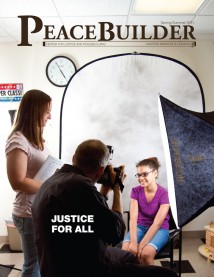Nathalie H. Thompson is a Virginia Supreme Court Certified Mentor Mediator and a member of the Restorative Justice (RJ) leadership team for Northern Virginia Mediation Service (NVMS) working to implement RJ in the Fairfax County, VA school and juvenile justice systems.

Restorative Justice and Practice Services
Workplace, religious organizations, community and government:
Restorative practices can be used to discuss difficult issues by creating a structure that allows everyone involved an equal voice in the discussion.
- Team disputes
- Group problem solving and decision making
- Team building
- HOA's
- Community issues
- Dealing with youth behavior by addressing "thinking errors” and helping youth develop better decision making skills. (Vandalism, fighting, interpersonal conflict, etc.)
Restorative services include:
We offer several types of Restorative interventions. We will decide together on the most appropriate intervention for your situation based on an in depth intake conversation.
Restorative inquiry: Restorative Inquiry is based on the principles of Appreciative Inquiry (AI). AI is a communication and problem-solving process that attempts to bring all voices to the table in conflict or change situations. With a focus on the positive, the process looks for common ground to find solutions and build foundations for better communication.
Restorative inquiry can be done between two parties and with groups.
Circle processes: Circles may be used for a variety of purposes ranging from planning and problem-
solving to team and community building. The basic guidelines for a circle include: Listening with
respect, each person has an opportunity to speak, one person speaks at a time without interruptions, people speak for themselves not at representative of others or of groups.
Once everyone has had an opportunity to be heard, issues/concerns and options for resolution have been identified groups may then choose to use other decision making tools such as Voting, Roberts Rules of Order, etc., as appropriate to their situation.
Restorative conferences: Conferences usually center on a specific incident or event and bring together victims and offenders. Conferences provide the opportunity to identify, repair and prevent the harm individuals have caused others. The harm may be to persons, property and relationships.
Requirements for a conference:
- Victim participation completely voluntary
- Offender participation based on his/her willingness and readiness
- Behavior-based: clear distinction between harmful act and actor
- Empowers participants
- Decisions are consensus-based
- Individual preparation for all parties who will be in attendance, through pre-conferences.
Youth and Schools:
Common youth and school behavioral issues that can be addressed with restorative justice.
Arson Interpersonal Conflicts
Assault Tardiness
Bullying/Harassment Theft
Drug/Alcohol Use Truancy
Fighting Vandalism
All school interventions will be coordinated with our NVMS Restorative Justice team.
Common youth and school behavioral issues that can be addressed with restorative justice.
Arson Interpersonal Conflicts
Assault Tardiness
Bullying/Harassment Theft
Drug/Alcohol Use Truancy
Fighting Vandalism
All school interventions will be coordinated with our NVMS Restorative Justice team.